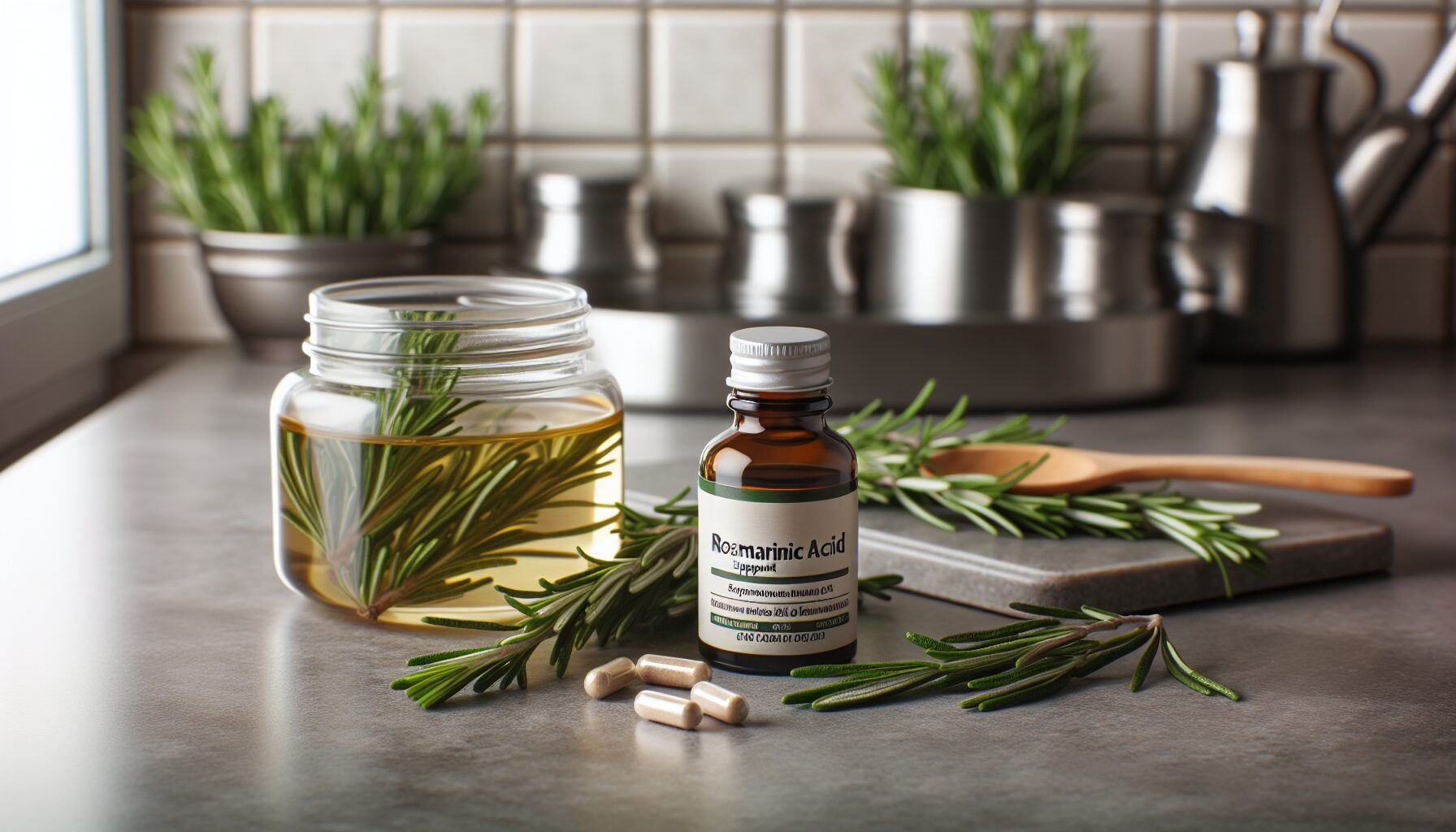
Rosmarinic Acid Supplement Benefits
Rosmarinic acid is a very strong antioxidant, with many reported potential health benefits, which is an essential component of rosemary extracts. This compound was given its name after having been isolated as one of the main active phenolic compounds within the rosemary herb. This polyphenol has since been found in many plants and herbs. These include sage, basil, oregano and lemon balm. Rosemary is an aromatic perennial herb and is often used in cooking. It was used as a form of medicine by various ancient cultures.
This naturally occurring phenolic compound also has anti-tumor potential, through normal cell cycle regulation, offering therapeutic potential for various diseases. Rosmarinic acid supplements are widely available and are sometimes used as an alternative medicine treatment for the prevention of hair loss. There are also very little, if any reported side effects. Topical Rosemary oil is often used as well to encourage hair growth and rosmarinic acid is well absorbed through the skin.
The antioxidant qualities of rosmarinic are thought to be a key reason for this effect on hair growth. Higher levels of oxidative stress are known to reduce appearance of skin and hair. Rosemary extracts, high in rosmarinic acid, seem to also promote collagen production and skin cell growth, improving the appearance of skin cellulite as observed in one study. The strong oxidant qualities of rosmarinic acid therefore seem to offer dual action health benefits within topical cosmetics and as a supplement too.
Let’s breakdown rosmarinic acid benefits in more detail to show their potential health benefits a little more clearly.
Anti-Microbial Potential Of Rosmarinic Acid
Found in varying amounts within many different medicinal plants and herbs, rosmarinic acid is considered to have health promoting effects. One key effect of rosmarinic acid is antimicrobial activity, while rosmarinic acid also seems to have effects on many microorganisms. This is explainable through the natural role of rosmarinic acid as a plant defensive compound, assisting plants with their own immunity. The natural phenolic properties of rosmarinic acid are why this compound has such a strong effect on different microbes.
The effects of rosmarinic acid are strong enough to be effective alongside some prescribed antibiotics. It seems to have a broad-spectrum inhibitory effect on various pathogenic microbes. Rosmarinic acid has been observed to reduce the number of harmful Salmonella within the gut. Rosmarinic acid also had potential against some candida fungus species, through antibiofilm properties. Biofilms are very important to the survival of many microorganisms.
Rosmarinic acid may also have antiviral benefits. The antiviral properties of rosmarinic acid are so strong that it is thought to be a potential therapeutic treatment for Herpes simplex viral infections. While rosmarinic acid also had effects against the Japanese encephalitis virus. Rosmarinic acid is recognised for some anti-HIV activities, being capable of blocking viral replication.
As rosmarinic acid is such a strong antioxidant, it may also stimulate the immune system against infections. This is called immunomodulation. Antioxidants can support key immune vitamin antioxidants, such as vitamin C, to upregulate the activities of the immune system against pathogens. This can include improved T killer cell or antibody production.
Studies support rosmarinic acid supplements as having the potential to support the immune system, including preventative benefits against harmful microorganisms.

Antioxidant Activity
In addition to supporting the immune system, via antioxidant support, rosmarinic acid may provide protection against various diseases including cancer and age degenerative diseases.
Rosmarinic acid has very clear antioxidant effects on harmful reactive oxygen species, reducing oxidative damage in the body. The antioxidant ability of rosmarinic acid against these compounds is because of its phenolic chemistry. High energy oxidative molecules are able to damage key part of cells causing harmful levels of cell stress. Ultimately, this could lead to the development of various cancers.
Key parts of cells that can be damaged by reactive oxygen species include cell membrane lipids, proteins and DNA. These parts need then need replacing. This process is also how the cellular ageing process works. Chronic oxidative stress accelerates ageing, reducing the body’s ability to recover from damage.
Through antioxidant support, rosmarinic acid can support healthy ageing or antiaging within the body. It can protect the DNA from damage and support optimal mitochondrial function to reduce damaging oxidative stresses. While it was shown to reduce fatty acid oxidation. These properties also were shown to help in protecting organs, such as the kidneys or testes, from damage. In the case of the testes, rosmarinic acid supported normal testosterone levels.
Rosmarinic acid also has a protective effect on the levels of important body antioxidants, such as reduced glutathione. Production of reduced glutathione was increased with rosmarinic acid use. This is a big marker of oxidation levels in the body and shows that rosmarinic acid can help to restore a normal oxidative balance.
Anti-Ageing Properties Of Rosmarinic Acid
The antioxidant properties of rosmarinic acid can protect the skin from UV damage and premature ageing. One important study has shown this practically, where rosmarinic acid protected essential cellular proteins. It also can prevent lipid peroxidation, protecting cell fatty acids found in large amounts in the skin.
Oxidative stresses, like sun damage, can also have big impacts on hair cell development and growth. The use of cosmetic topical antioxidants can assist with reducing lack of hair growth and hair loss. Rosemary extract, or rosemary oil, abundant in antioxidant rosmarinic acid is often used to address hair loss or alopecia. It is thought to be able to promote hair follicle regeneration, improving blood flow to important hair growth promoting cells. Rosmarinic acid may also prevent hair damage, conserving hair quality and colouration.
Higher antioxidant status, as encouraged by rosmarinic acid, reduces bodily stress responses. This, in addition to stabilised testosterone levels, promotes normal metabolic hair growth.
Anti-Inflammatory Effects
Rosmarinic acid seems to reduce inflammatory responses in the body including the production of inflammatory cytokines, which had observable benefits on arthritic symptoms and allergic responses. Because of the significant decrease in inflammatory responses, it may be a successful support for allergic asthma.
This compound may provide supporting benefits on inflammatory diseases. That includes age related inflammatory brain diseases. Rosmarinic acid was shown to have benefits in enhancing cognitive functioning, while improving memory and learning. Rosmarinic acid could have supplemental benefits against alcoholic dementia.
Some neuroprotective effects are thought to be from normal energy production support in the mitochondria. The antioxidant protective effects towards essential fatty acids of the brain is also thought to have a big influence. Overall studies show that rosmarinic acid protects nerve cells from damage.
Rosmarinic Acid Anti-Cancer Potential
Chronic oxidative stress causes a massive imbalance of antioxidants in the body. Where you have chronic oxidative stress, you will see a reduced capacity of the body to detoxify and repair itself from oxidative damages. Naturally, this is going to affect healthy growth and can even lead to the development of cancers. Cancers are when abnormally functioning cells start to replicate out of control.
Rosmarinic acid has been used against cancerous tumor cells. It impaired tumor development and encouraged a more natural cell cycle. These effects were dose dependent, so they were larger as the dose increased.
One important effect was natural cell cycle regulation through improved levels of apoptosis or cell death. There are various genes that this compound may target to support cancer prevention and reduction. There were also measurable antioxidant effects within these cells, which is important for cancer prevention. Rosmarinic acid shows promise as a protective supplement against skin cancers, with anti-inflammatory properties.

Cardioprotective Effects
Rosmarinic acid also seems to have heart health conserving properties. Some effects observed in studies with rosmarinic acid include an improvement in HDL levels, with a reduction in LDL levels. This has potential for to be useful for people at risk of cardiovascular diseases resulting from atherosclerotic plaque build-up in the blood vessels.
Other potential heart protective functions include protecting blood vessels from damage. This is linked to reduced oxidative stress in the body. Rosmarinic acid also seems to have blood pressure lowering effects. This is thought to occur by influencing various risk factors linked to elevated blood pressure, including lowering inflammatory cytokine levels and blood vessel damage. We’ve mentioned that rosmarinic acid helps to support mitochondrial energy production, this also has an influence on protecting the health of the heart.
Rosmarinic Acid And Diabetes
Diabetes occurs as a result of a disorder in the production or signalling of the insulin hormone. Insulin is required for normal glucose use. This causes glucose levels to rise to very high levels and can cause organ damage or loss of consciousness.
Rosmarinic acid shows promise for diabetes prevention. One study showed it reduced insulin resistance, which helped with normal insulin production and signalling. The antioxidant properties of rosmarinic acid also supported with the inflammatory effects of diabetes.

Summary
Rosmarinic acid is a compound well known to research, with various reported potential health benefits. It is one of the main actives in the rosemary herb and has been used as a form of medicine by various ancient cultures. Topical rosemary oil is used as an alternative treatment for the prevention of hair loss.
Modern medicine has identified rosmarinic acid as having anti-tumor potential. Its phenolic chemistry is responsible for most of its antioxidant and resulting health properties.
This includes anti-microorganismal activity, such as the inhibition of the growth of Salmonella and harmful fungal species. Rosmarinic acid may also have antiviral benefits, blocking the replication of some harmful viruses. Its antioxidant properties mean that it is able to offer immunomodulation potential, improving key activities of the immune system.
Rosmarinic acid could also protect the body from the harmful effects of reactive oxygen species and encourage healthy ageing. Chronic oxidative stress accelerates ageing, limiting the body’s ability to recover from damage. Antioxidants such as rosmarinic acid reduce oxidative stress, protecting the body from developing cancers.
Rosmarinic acid use may also protect organs from damage. The antioxidant properties of rosmarinic acid can protect the skin from UV damage and premature ageing. Oxidative stresses can also have big impacts on hair cell development. Rosmarinic acid may promote hair follicle regeneration.
Rosmarinic acid seems to reduce inflammatory responses, having observable benefits on arthritic symptoms and allergic responses. It seems to affect expression of key tumor progression genes, offering tumor preventative properties through improved cell cycle regulation. Rosmarinic acid also seems to have heart health conserving properties, such as HDL level improvement and blood vessel protection. While it may also have potential in diabetes prevention.
For more interesting articles, see the main articles page below.





